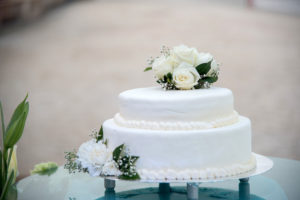Masterpiece Cakeshop vs. Colorado Civil Rights Commission: Will the Supreme Court Grant the Constitutional Right to Discriminate?

This Tuesday the United States Supreme Case will hear oral arguments on the controversial Masterpiece Cakeshop vs. Colorado Civil Rights Commission case. In anticipation, the Center for American Progress (CAP) hosted a panel to discuss how this case isn’t just about religious freedom; it’s about granting the constitutional right to discriminate.
Back in 2012, David Mullins and Charlie Craig went to Masterpiece Cakeshop in Colorado to order a cake for their upcoming wedding. But the owner of the bakery, Jack Phillips, turned them away because selling a wedding cake to a same-sex couple violated his religious beliefs. Mullins and Craig successfully filed suit with the Colorado Civil Rights Commission arguing that Phillips violated the state’s anti-discrimination laws. Philips, represented by the ultra-conservative and Christian Alliance Defending Freedom (that has argued for the criminalization of homosexuality and the mandatory sterilization of transgender people), appealed to the Supreme Court.
This case is a threat to the rights of LGBTQ people. If the Supreme Court grants Phillips his exemption, businesses will be allowed to discriminate against same-sex couples exercising their constitutional right to marry. This will set a legal precedent for businesses to decline other services to LGBTQ individuals under the guise of religious freedom. The result of this case will also be consequential for civil rights as a whole in the United States, as a bad decision by the Supreme Court will essentially undermine legal protections for all marginalized groups, establishing a model for future discriminatory legislation.
To ensure that the public is aware of what’s at stake, the Center for American Progress hosted a panel of national leaders including Elise Boddie, professor of law at Rutgers University; Rebecca Cokley, senior fellow at CAP; Louise Melling, deputy legal director at the American Civil Liberties Union; and Dariely Rodriguez, director of the Economic Justice project at the Lawyers’ Committee for Civil Rights Under Law. In her welcoming remarks, CAP Vice President of Legal Progress Michele Jawando summarized the significance of the case, stating: “this is a moment where we will see the undermining of a precedence that has protected racial and other marginalized communities for decades.”
This isn’t the first time that religion has been used to discriminate. “What we’re seeing in Masterpiece is nothing new. Religion has been used in the past to try and defend slavery, segregation, to defend discrimination,” Rodriguez said. We are using the very same tactics to discriminate today as we were in 1968, and we need to be cognizant of that. Rodriguez referenced a 1968 case, Newman vs Piggy Park Enterprises, where a barbeque chain owner refused to serve three individuals of color because doing so would contravene the word of God. He was eventually found to be in violation of Title 2 of the Civil Rights Act, yet we are still arguing this kind of discrimination today.
Rebecca Cokley laid out the way in which a bad decision in this case will affect the disability rights community. Currently, those with disabilities are facing an onslaught of attacks on public accommodations, along with legislation like HR620 that loosens the interpretation of preexisting law to essentially allow establishments to remain inaccessible. “The concern that we really have in particular is as it relates to people with disabilities who receive medical care. A majority of those providers, those hospital chains, the nursing home companies, the personal care tenant services are religiously based.” And we’ve certainly seen religious hospitals denying adequate medical care to patients because of religious beliefs before.
All panelists agreed that the law is clear on the matter. Public accommodations law states that all persons are entitled to the services of any business “without discrimination or segregation on the ground of race, color, religion, or national origin.” And the Supreme Court has never held that for-profit businesses have a free speech right to discriminate. So it remains unclear as to why the Supreme Court is even hearing arguments in this case.
One reason may be because the US government doesn’t view the case as so cut and dry. Back in September, the Justice Department filed a friend of the court brief in support of the bakery. “Even if a custom wedding cake is not pure speech, Phillips’s act of designing and creating the cake is at least expressive conduct. That act involves both a subjective intent to convey a message and a significant likelihood that the message will be understood by those who view the final product,” the brief said. When faced with scrutiny over the potential ramifications, the DOJ disturbingly assured that this case was the single exception to civil rights law and that it will only affect LGBTQ individuals.
In addition to the disconcerting reality of the US Government condoning discrimination against LGBTQ individuals (without explanation), the panelists brought up another point—law is cumulative. Perhaps this decision won’t directly affect other marginalized groups in the short term, but it will certainly lay the groundwork for other legislation to do so. Eventually, we could see a gradual erosion of all civil rights protections. As Rodriguez pointed out, this case comes down to who we are as a country. “We’ve read this playbook before. You create a social hierarchy, then you put people at the bottom of the social hierarchy, and then you systematically deny them all kinds of rights and the ability to participate in a way that feels like you belong to the national community.” Rodriguez continued, “It’s part of the systematic dismantling of protections for people who are perceived to not belong, to be perceived as others, to lie outside our national space.”
To watch the Center for American Progress discussion and to learn more about Masterpiece Cakeshop vs. Colorado Civil Rights Commission before the Supreme Court hears arguments on Tuesday, click here.
